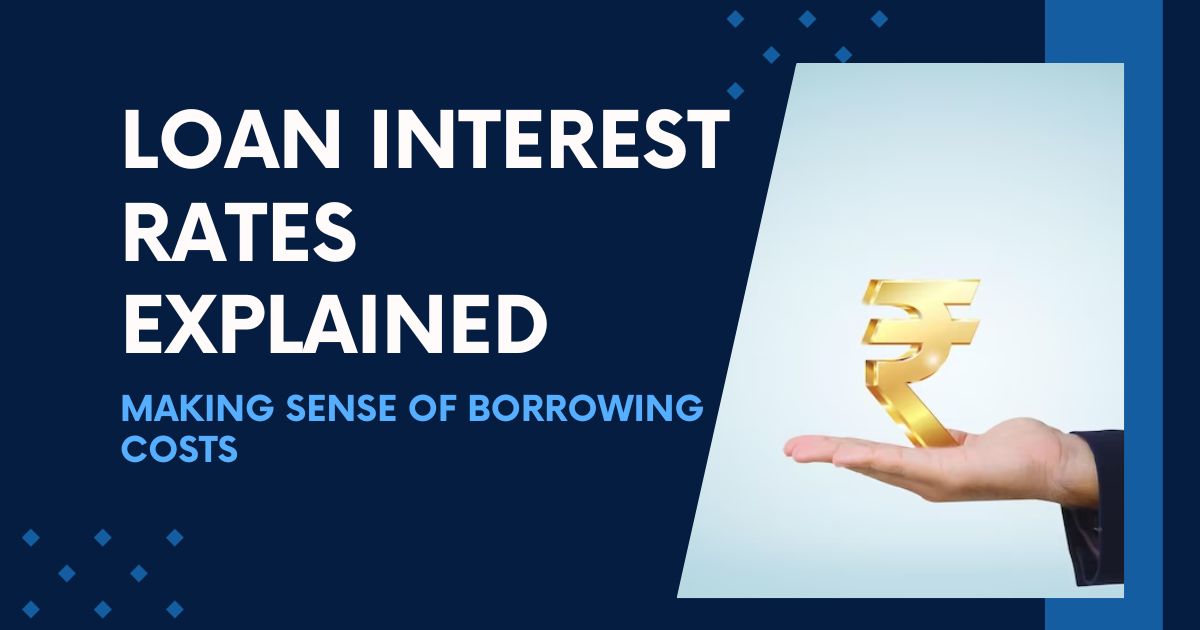Introduction
Many of us must borrow money. It is very helpful when buying a home, a car or even for personal reasons. When you borrow money however, you receive more than just the principal. You are also paying interest on it. Understanding how loan interest rates work is crucial to making wise financial decisions. In this article we will discuss about loan interest rates, making this information easy to understand for your financial need.
Types of Loan Interest Rates
Fixed Interest Rates
When you opt for a fixed interest rate it means your interest rate remains constant throughout the loan tenure. This provides predictability and makes budgeting easier. However it might be slightly higher than the floating rates and if the market interest rates drop you won’t benefit from it.
Floating Interest Rates
Floating interest rates also known as variable rates. These rates change periodically based on market conditions and RBI policy rates. While they might start lower than fixed rates, they can fluctuate, making it harder to predict your future payments.
Factors Influencing Loan Interest Rates

RBI Policy Rates
The Reserve Bank of India plays an important role in determining loan interest rates. RBI sets various policy rates like the repo rate which influence how much interest you pay on loans. When RBI reduces these rates banks tend to lower their loan interest rates making borrowing cheaper.
Credit Score
Your credit score is like your financial report card. Lenders use it to assess your creditworthiness. A high credit score can get you lower interest rates while a low one can result in higher rates. Paying bills on time and managing credit responsibly can boost your score.
Loan Tenure
The loan tenure or how long you take to repay the loan also affects interest rates. Longer tenures may come with higher interest rates increasing the overall cost of borrowing. Shorter tenures often mean lower interest rates but higher monthly payments.
Types of Loans and Their Interest Rates
Home Loans
Home loans come with some of the lowest interest rates due to their secured nature. Factors like your credit score and the loan tenure play a role in determining the interest rate. Shopping around for the best home loan deal is crucial.
Personal Loans
Personal loans are unsecured loans making them riskier for lenders. Therefore they usually come with higher interest rates compared to secured loans like home loans. Your credit score and income level significantly influence personal loan interest rates.
Car Loans
Car loans fall in between home loans and personal loans in terms of interest rates. They are typically lower than personal loans but higher than home loans. The type of car, down payment and loan tenure can affect your car loan interest rate.
Understanding the EMI
The EMI is the monthly repayment amount you need to make on your loan. It consists of both the principal amount and interest. Understanding how interest rates affect your EMI is crucial. Higher interest rates mean higher EMIs, so it isessential to calculate your EMI before taking a loan to ensure it fits your budget.
Tips for Getting the Best Interest Rates

Improving your credit score
Work on maintaining a healthy credit score by paying bills on time, reducing outstanding debts and avoiding unnecessary credit inquiries.
Comparing loan offers
Never accept the first loan offer. To get the best deal, search about, compare interest rates and discuss with lenders.
Negotiating with lenders
Don’t hesitate to negotiate with lenders for better interest rates. They can sometimes agree to reduce costs in order to profit from your business.
Conclusion
Loan interest rates can have a big impact on your financial situation. Interest rates on loans can have major effects on your financial status. If you understand the various types of rates, the factors that influence them and how they affect your EMIs, you can make informed borrowing selections. Remember that being a wise borrower is the key to financial success. You will be more equipped to negotiate all kinds of loans and interest rates if you prepare yourself with knowledge.
Also Read : SME Success Stories: Real Businesses Thriving with HDFC Business Loan Support
Unlocking Local Opportunities: Your Guide to Finding Business Loans Near You
Frequently Asked Questions
Q.1 What’s the significance of loan tenure in determining interest rates?
The loan tenure, or how long you take to repay the loan, can affect interest rates. Longer tenures may come with higher rates.
Q.2 Can I switch from a fixed interest rate to a floating rate during my loan tenure?
Some lenders offer the option to switch between fixed and floating interest rates, but it may involve additional fees and conditions.
Q.3 How often do floating interest rates change, and can I predict these changes?
Floating interest rates can change periodically, and predicting these changes can be challenging as they depend on various market factors.
Q.4 How does the Reserve Bank of India (RBI) influence loan interest rates?
RBI sets policy rates like the repo rate, which impact the interest rates offered by banks. When RBI lowers these rates, banks tend to reduce their loan interest rates, making borrowing more affordable.
Q.5 Why is my credit score important for loan interest rates?
Your credit score reflects your creditworthiness. A higher credit score indicates responsible credit behaviour and can result in lower interest rates. Conversely, a lower credit score might lead to higher interest rates or difficulty in securing a loan.
Q.6 What are fixed interest rates, and how do they differ from floating interest rates?
Fixed interest rates remain constant throughout your loan tenure, providing predictability in your payments. Floating interest rates, on the other hand, can change periodically, influenced by market conditions and RBI policy rates. While fixed rates offer stability, floating rates can initially be lower but carry the risk of fluctuation.
Related Post :
Smart Borrowing Strategies: How Loan Rates Impact Your Financial Decisions
